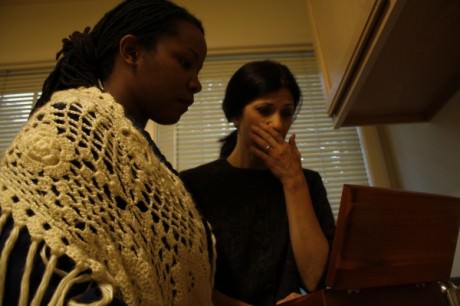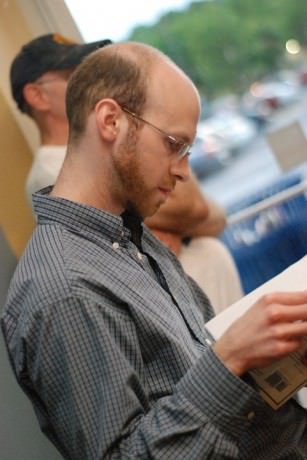Welcome to the Edge of your Seat;
Unexpected Stage Company Presents Harold Pinter’s The Dumb Waiter and Susan Glaspell’s Trifles, July 20-August 12.
Harold Pinter and I began dating junior year of college. Well, I was in college; he was off being famous and brilliant somewhere without me. A year later, I discovered Susan Glaspell in a feminist literary course. Again, love at first sight. Harold and I were, of course, still together, but no one thought twice of the arrangement.

I first saw The Room and Celebration in London’s Almeida theater, in the spring of 2000; his first play presented with what would be his last. Celebration’s oddities and defining humor was pleasant enough, but what punched me in the face was the danger and psychological chutzpah of his first play: a story set in the confines of a derelict couple’s working class lodging, their tension and eroding marriage gives birth to a kind of blind vigilante, who deems to save Rose, the passive and abused wife. I won’t give away the ending in hopes that it soon arrives at a theater near you. The play, in short, ignited and reignited my love for theatre, and instilled a passion for thoughtful, choreographed directing, a need for intellect, and a desire to uncover human motivations and conditions. The theatre that night changed from a place of lies to a place attempting to uncover the intricacies of the human spirit, however battered, however dwarfed. In short, this was important work.
Soon, I bought every Harold Pinter play I could find, and stumbled (quite deliberately) on The Dumb Waiter. I couldn’t stop reading it. I suggested it to friends, lovers, acquaintances, strangers, countrymen. I wanted book discussions, lectures, theories, treatises. Particularly, I wanted someone to tell me what the hell it meant. I mined for answers, decisions, truths. I became half-obsessed. What I didn’t know at the time was that it offered the very thing I was looking for. No answers, more questions. Pinter allowed me to grow comfortable in the unknown.
And so, the afternoon before Unexpected Stage Company begins rehearsing The Dumb Waiter, I only half understand it. What the hell am I going to tell the actors tomorrow? The designers? The team whose objective is to make tangible my vision? I have no idea. And perhaps that is what Pinter intended. That sly, handsome, son of a bitch.
Glaspell was the first Harold Pinter. Her silences, deliberate sense of menace, unease, and quiet discovery, would later become Pinter signatures. Unlike The Dumb Waiter, Trifles is a play included in many high school and college literary anthologies. It is talked about far and wide, usually in the context of early 20th century feminist theory, but I’ve noticed, seldom produced. It is a work that challenges both its female characters and their male counterparts. Glaspell wrote a play in which women struggle to find an accepted voice in a male dominated culture of power. As such, they end up siding with the destruction of that culture, by any means necessary.

Interesting to note that nearly 100 years after it was written, women still struggle to find a voice in the theater, or, to be more accurate, to have their voices heard. (We know the voices are there, but haven’t always been allowed in.) How many female Directors do you know currently working in D.C.? What is the percentage of female Artistic Directors to their male counterparts? The irony, of course, is that this is an industry dominated by women. I believe there must be 5 women trying to make it in this business for every one 1 man.
Politics aside, Trifles is a great script, and an intriguing story. As a college senior, desperate for a kind of intellectualism on stage, a kind of riddle-induced suspense, Trifles was the perfect treat. As with Pinter, there are 2 plays here: the play that happens within the dialogue and a play taking place within a menacing silence. What is not spoken becomes infinitely more important than what is. Perhaps this is my inner man speaking, but I am quite comfortable with this. With the onslaught of the internet, our means of communication is getting infinitely more diverse, and yet, our communication is not improving. Speed does not equal meaningful interaction, or even fact based simplicity. In fact, you could argue, our communication is suffering.

Add to this that Glaspell is a voice that surfaced, a female playwright writing convincing male characters, and an intriguing psychological prescription for her country’s ills. (That prescription comes with a noose!) Glaspell based the play loosely on actual events—a small town murder with lasting implications.
What intrigues me as a director is that both playwrights are not interested in the murder itself. They focus on what happens before and after the killings take place. What do people say around a murder? What is discovered? What is left hidden? Intrigued? I’m getting giddy simply thinking about it. I hope you’ll join in the discussion.
Unexpected Stage Company presents The Dumb Waiter by Harold Pinter and Trifles by Susan Glaspell at The Randolph Road Theatre – 4010 Randolph Road, in Silver Spring, MD from July 20th-August 12th. Directed by Christopher Goodrich. Tickets: $8-$25, can be purchased at the door or online.




